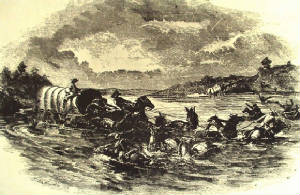|
The Texas Civil War refugee did not necessarily
fit the typical refugee image. Most were wealthy and many could afford and found housing in Texas, even if it meant sharing
with other refugee families. Others took up residence with family members or on property they owned in Texas.
When the war began slave owners
in other slave states saw Texas as a relatively safe place. The distance from the battles then occurring in the east and the
size of the state led slave holders from other southern states to remove entirely to Texas or at least
to send their slaves. They felt their slaves would be safer from Federal confiscation in Texas. Allen V Manning of Coryell
County remembered “The next spring old Master loaded up again and we struck out for Texas, when the Yankees got too
close again….About that time it look like everybody in the world was going to Texas. When we
would be going down the road we would have to walk along the side all the time to let the wagons go past, all loaded with
folks going to Texas.”2

As the war progressed and more
Federal occupation occurred in the south, those who could afford to left their homes and came to Texas. Families from Louisiana,
Tennessee, Kentucky, Mississippi, Arkansas, Virginia and Missouri came to Texas trying to avoid the
war and its associated hardships. Not all of these out-of-state refugees were welcome in Texas. Kate Stone, refugee from Louisiana
in Tyler, Texas, wrote in her diary in 1863, “They call us all renegades in Tyler. It is strange the prejudice that
exists all through the state against refugees.”3
Even the governor of Louisiana
remarked on the lack of hospitality toward Louisiana refugees to Texas: "They have...sought, with their slaves, a refuge
in the neighboring State of Texas. Many have brought or sent back painful accounts of their reception.
There should not be wanting the exercise of another knightly quality—the duty of hospitality."4
In addition to out-of-state
refugees, people escaping Federal occupation in Galveston flooded the Texas interior. The Austin State Gazette published in
1862 "The evacuation of Galveston has thrown hundreds of the poor of that city upon the country to be supported. "5 Several families from the interior volunteered to take in families from
Galveston, but others were left to fend for themselves as recorded by the Austin American Statesman in 1863 "Hundreds
of people are now on the prairie without anything to eat, or shelter of any kind."6
|

